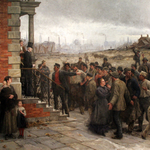'Alles strijdt, wat naar vrijheid haakt.' Theorievorming over de staking in de Belgische politiek, 1884-1914
DOI:
https://doi.org/10.18352/bmgn-lchr.5654Keywords:
Politics, StrikesAbstract
Struggling for freedom. Social theory on strike actions in Belgian politics, 1884-1914
In nineteenth century workers' songs, the strike was presented as a heroic struggle for freedom. At first sight, the arguments in political debates more or less followed this same line of thought, in that several 'socially progressive' politicians defended strike actions using the argument of 'right of association'; a right that the working class also claimed in their struggle for emancipation. Yet the dominant political attitude towards the social question during those years was inspired by social control rather than emancipation. Therefore, when petitioners had to arouse parliamentary sympathy for strikes, they smartly abandoned the discourse linked to the struggle for freedom, and instead chose to present strikes not as heroic, voluntary actions, but rather as something inevitable; a 'force majeure'. This presentation was a radical departure from the traditional liberal values of individual responsibility, and was, instead, inspired by a very modern sociological discourse. This even went so far as to question the ultimate roots of the legal system itself, viz. the basic principles of civil law.
Downloads

Downloads
Published
Issue
Section
License
Authors who publish with this journal agree to the following terms:
a) Authors retain copyright and grant the journal right of first publication with the work simultaneously licensed under a Creative Commons Attribution 4.0 International (CC BY 4.0) that allows others to share the work with an acknowledgement of the work's authorship and initial publication in this journal.
b) Authors are able to enter into separate, additional contractual arrangements for the non-exclusive distribution of the journal's published version of the work (e.g., post it to an institutional repository or publish it in a book), with an acknowledgement of its initial publication in this journal.
c) Authors are permitted to post their work online (e.g., in institutional repositories or on their website) prior to and during the submission process.
Authors are explicitly encouraged to deposit their published article in their institutional repository.








